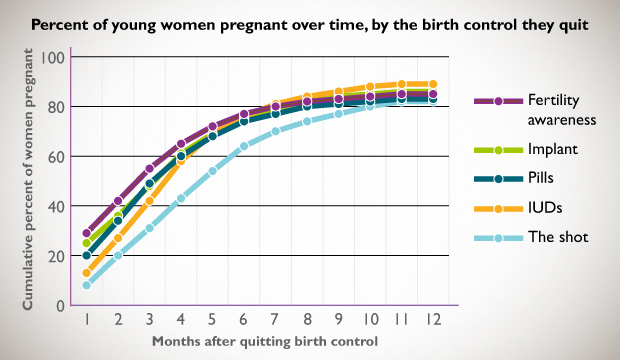Does Birth Control Make It Harder To Get Pregnant Later
Women under thirty years old are incredibly fertile—their ability to get significant is at its peak. In the U.S., about three in iv sexually active women under 30 are using some type of birth command. Simply many of them enquire me, does using birth control now hurt my chances of getting pregnant in the future? Sigh of relief: it does not.
All reversible nascency control methods will assistance prevent pregnancy while you're using them, but none accept long-lasting effects on your ability to get pregnant when you cease. That's why people who use the pill only accidentally forget to accept it for a few days can become significant that calendar month.
Permit's expect, for example, at how long information technology takes for women to become pregnant when they quit the pill compared to when they quit non-hormonal fertility awareness methods (FAM, sometimes called natural family planning). A big study of over 2,000 women who quit the pill later using it for an average of seven years found that 21% were pregnant in one month and 79% were pregnant in a yr. Women who stopped using FAM had very similar rates of pregnancy, with 20-25% pregnant in ane month and fourscore% pregnant in a year. In other words, women who quit the pill become pregnant just as fast every bit other women, even if they've used the pill for years.

Women who quit the patch, band, or IUD get pregnant at like rates. Contrary to pop myth, modern IUDs do not hurt your future fertility. For some women who end using the implant or the shot (Depo-Provera), it tin take a few extra months to start normal menstrual cycles over again. There may be a delay of upwards to two months later stopping the implant and up to 6 months subsequently stopping the shot, merely this varies from person to person, and most women go pregnant before long after stopping these methods.
Okay, so birth control doesn't hurt your chances of having a baby in the future. Simply there is something that does: untreated sexually transmitted infections (STIs). By the age of 25, one in 2 young people having sexual practice volition go an STI.
One of the most common STIs is a bacterial infection chosen Chlamydia. It's transmitted by sexual contact, and can be prevented by using condoms. It'due south like shooting fish in a barrel to care for with antibiotics, but information technology's sneaky: three in four women with Chlamydia don't know they take information technology because they have no symptoms. Half of men with Chlamydia have no symptoms either. The longer an STI like Chlamydia or Gonorrhea goes untreated in the female person reproductive system, the higher the chance that it volition crusade scarring in the tubes that connect the ovaries and uterus. That scarring makes it hard for an egg to travel the right direction, and hurts your chances of getting pregnant in the future.
If you had sex activity with a new partner and didn't utilize a condom, you tin can still protect yourself by getting tested. Luckily, getting tested for Chlamydia or Gonorrhea is easy and painless: you just pee in a cup. Getting treated just means taking some pills for a week. If you test positive, there are a bunch of dissimilar ways you can tell a partner he or she should become tested. And for future reference, here are some tips for making sexual activity safer.
If you've never been tested, check out GYT—Get Yourself Tested, Get Yourself Talking. Lots of health centers around the country offer free or reduced cost testing. Observe a place to go tested and keep infertility from sticking to y'all!
Does Birth Control Make It Harder To Get Pregnant Later,
Source: https://www.bedsider.org/features/76-birth-control-and-infertility-does-using-birth-control-hurt-my-chances-of-getting-pregnant-later
Posted by: bastaracheprostand.blogspot.com


0 Response to "Does Birth Control Make It Harder To Get Pregnant Later"
Post a Comment